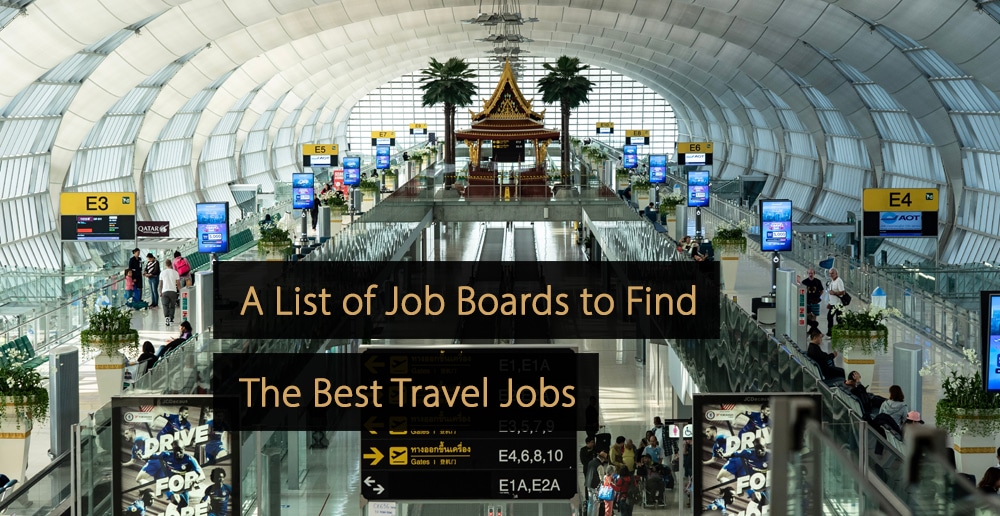There is a wide range of different tourism careers to consider, with individual positions ranging from entry-level jobs, to senior management roles. However, it is also a competitive industry, so it is worth taking as many steps as you can to improve your prospects. In this article, you will find a number of useful tips to help you to find a job.
Table of Contents:
- All You Need to Know About the Tourism Industry
- Tourism Careers: Tips to Find a Job in the Tourism Industry
- 1. Start Your Tourism Career with the Right Education and Training
- 2. Stand Out From the Crowd By Creating an Excellent CV
- 3. Use Personal Branding for Boosting Your Tourism Career
- 4. Turn to Travel Job Boards to Find Your Next Tourism Career Move
- 5. Learn How LinkedIn Can Boost Tourism Careers
- 6. Let Recruitment Agencies Specialised in Tourism Careers Assist You
- 7. Make Sure You Prepare Properly for Your Job Interview
- 8. Give Yourself the Best Chance of Interview Success on the Day
- 9. Understand the Importance of Networking During Your Tourism Career
- Tourism Manager: Job Description and Important Tips
- List of Websites for Finding Tourism Management Jobs
- All You Need to Know About Tourism Management
- Tourism Course: How Education Can Assist With Tourism Careers
All You Need to Know About the Tourism Industry
First, it is worth pointing out that the tourism industry itself includes a huge number of different sectors, from accommodation and transportation, through to entertainment, travel services and the food and beverage sector. Before embarking on a tourism career, it can pay to take the time to learn as much as you can.
Check out “Tourism Industry: Everything You Need to Know About Tourism” for background on each of the different sectors, details on the benefits of the tourism industry, and useful information about the latest industry trends.
Tourism Careers: Tips to Find a Job in the Tourism Industry
The following nine tips can all help to advance tourism careers of all types.
1. Start Your Tourism Career with the Right Education and Training
The first step towards improving your chances when applying for tourism or travel jobs is to make sure you have the right level of education and/or training. Formal education in the field you are applying for is always advantageous and senior roles, such as management jobs, may require a bachelor’s degree in some cases.
Yet, it is also true that tourism careers are accessible to those who do not have formal qualifications and the industry is ideal if you are willing to enter into employment with an entry-level position and then work your way up the career ladder by gaining relevant experience over time.
Any training or qualifications you have could prove to be useful. You should also capitalise on any opportunities that come up during your career, in order to learn new skills and develop existing ones further, as this can place you in good stead.
2. Stand Out From the Crowd By Creating an Excellent CV
When you apply for a job, the first thing a recruiter or employer is going to judge you on is the quality of your CV. When jobs have a large number of applicants, a significant number will be rejected solely based on the quality of their CV, so it is absolutely crucial that you take the time to make it as strong as you possibly can.
In terms of how you can create an excellent CV, it is imperative that you do not simply use a generic document that you have sent to countless other employers. Instead, you need to tailor it to the job you are applying for, highlighting the most relevant parts of your career history and academic qualifications, and removing irrelevant information.
Keep your CV as concise as you can, while still mentioning everything you need to include. One particularly useful tip is to read the job description and person specification for the role you are applying for and try to include references to the qualities they are actively seeking. You can also tailor your use of language to match the terminology they use.
3. Use Personal Branding for Boosting Your Tourism Career
Personal branding refers to the practice of using branding techniques to enhance your personal standing and it can be a great way to build your reputation and set yourself apart from other applicants. It is especially useful when creating and maintaining accounts on social networking sites, such as LinkedIn, but also in other areas too.
For instance, one of the first things any employer is likely to do after they see your application and express interest is to perform a Google search focusing on your name. For this reason, it can be beneficial to set up a personal website, using a platform such as https://about.me/ and then ensuring the website presents you in a good light.
You need to manage your various social media profiles and make sure nothing on them would put off employers. You can also make useful posts about travel and tourism, or create relevant content to establish your credibility and expertise. However, it is important that your branding attempts are authentic and consistent.
4. Turn to Travel Job Boards to Find Your Next Tourism Career Move
Actually finding vacancies can be one of the most challenging aspects of beginning a tourism career, but industry job boards often prove one of the best solutions. These websites allow employers to advertise jobs that they want to fill, while allowing job seekers to find vacancies and apply for them online.
Read “Tourism Jobs: The Best Tourism Industry Job Boards for Your Career” for a breakdown of the various industry job boards that are available, sorted based on the section of the tourism industry they are most concerned with.
5. Learn How LinkedIn Can Boost Tourism Careers
LinkedIn is the most important social networking platform for career purposes, because it allows you to build professional networks. This gives you the opportunity to speak to people who are already working in travel careers, ask them for advice and potentially even benefit from their contacts and personal influence.
On top of this, the platform also provides a ‘Jobs‘ page, which functions in a similar way to other online job boards, with employers using the service to advertise vacancies. This can potentially help you to find opportunities that are not listed on other websites and you can even set up alerts, so you are notified when new jobs are posted.
6. Let Recruitment Agencies Specialised in Tourism Careers Assist You
The main job of a recruitment agent is to find suitable candidates for a vacancy and, with this in mind, they primarily work on behalf of businesses or organisations that are looking to hire new staff. Nevertheless, recruitment agencies also want to hear from candidates and will often work with you to assist your efforts.
One of the biggest benefits of working with recruitment specialists who are focused on linking people up with tourism careers is the ability to capitalise on their knowledge and contacts. They will often know exactly what specific employers are looking for and they will also have contacts within the industry who may be able to help you.
7. Make Sure You Prepare Properly for Your Job Interview
Once you get past the application stage and are invited for an interview, it is absolutely critical that you take the time to prepare properly. Make sure you have read up on the job as much as you possibly can and also take the time to research the employer and, if possible, the people interviewing you too.
Ensure you have appropriate clothes to wear to the interview and research routes to the venue in advance, so that you can guarantee you will not get lost or turn up late. It is recommended that you take the time to run through some practice interview questions in advance too and then prepare answers to the most common interview questions.
8. Give Yourself the Best Chance of Interview Success on the Day
Almost all tourism careers begin with an interview, and you need to give yourself the best chance of success when the time comes. Make sure you get a good amount of sleep the night before and try to go in looking as presentable as you possibly can. Turn up at the venue a little bit early and give yourself time to compose yourself.
Try not to rush into your answers during the interview and instead take a second to gather your thoughts. One useful tip is to take a few extra copies of your CV into the interview with you. This will help if you need to refer to it and will ensure everyone in the interview has a copy. You should also prepare some intelligent questions of your own.
Video: Job Interview Skills – Common Interview Question and Answers
In this video you will learn how to answer the most common questions during a job interview.
9. Understand the Importance of Networking During Your Tourism Career
It is often said that ‘who you know‘ can be just as important as ‘what you know‘ and this can certainly ring true within many tourism careers. For this reason, professional networking is of the utmost importance and you need to take the time to build and manage both your offline and online contacts.
Online networking will often take place via social media, with LinkedIn and Twitter being good examples. Networking can be as simple as commenting on someone else’s social media post, sharing useful content with them, or asking them questions. Offline, you can potentially network with colleagues, customers, clients and business partners.
There are some important things to remember, however, when it comes to finding work. For one thing, you should avoid outright asking for a job and instead talk about what you are hoping to find or what your goals are. Do not put anyone in an uncomfortable position. If people are willing and able to help, they will read between the lines. It is also crucial to understand that networking works both ways and you need to be willing to help others too.
Tourism Manager: Job Description and Important Tips
The job of a tourism manager is one of the most sought after tourism careers, but before applying, it is vital that you have an appreciation of what the job is, what it will actually entail and which employers you should be looking to target. After all, the entire travel and tourism industry is extremely diverse.
Read “Tourism Manager: Job Description and Important Tips” for more information on the nature of the role itself, along with some practical advice on how you can go about finding a tourism managerial vacancy.
List of Websites for Finding Tourism Management Jobs
Actually finding vacancies when they become available is a crucial part of any successful tourism career, and this is certainly true when you are looking for tourism management jobs online. After all, these are among the most desirable jobs in the industry, so you do not want to miss out on opportunities when they do come up.
The “List of Websites for Finding Tourism Management Jobs” article provides a detailed list of the various online platforms that are available to you and explains how they may assist you over the course of your job search.
All You Need to Know About Tourism Management
For those interested in long-term tourism careers, it can always be beneficial to learn about tourism management. In particular, you need to know what it is, what the requirements for the role are, which sectors tourism managers work in, the key responsibilities and the ways new trends and technology are changing the nature of the role.
If you read the “All You Need to Know About Tourism Management” article, you will be able to access information on these various topics and a whole lot more besides, enhancing your understanding of what tourism management is.
Tourism Course: How Education Can Assist With Tourism Careers
Finding the right tourism course can significantly boost your long-term career prospects. Of course, there are a wide range of different tourism careers to choose from, so you may need to think carefully about the field you would like to work in and then find the most relevant course for teaching related skills.
You can find out more about tourism courses, the options available to you, what you might expect to learn and where you can find the right course by reading “Tourism Course: A Complete Overview of Courses & Tourism Educators”.
Tourism careers are competitive and that competition only becomes more fierce the further you progress. Fortunately, the tips provided in this article can help you to successfully navigate everything from the application phase to the actual interview itself, giving you the best possible chance of getting ahead.
More Tips to Grow Your Business
Revfine.com is the leading knowledge platform for the hospitality and travel industry. Professionals use our insights, strategies, and actionable tips to get inspired, optimize revenue, innovate processes, and improve customer experience.Explore expert advice on management, marketing, revenue management, operations, software, and technology in our dedicated Hotel, Hospitality, and Travel & Tourism categories.
This article is written by:
Hi, I am Martijn Barten, founder of Revfine.com. With 20 years of experience in the hospitality industry, I specialize in optimizing revenue by combining revenue management with marketing strategies. I have successfully developed, implemented, and managed revenue management and marketing strategies for individual properties and multi-property portfolios.









Leave A Comment